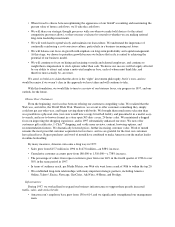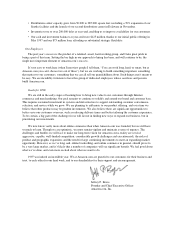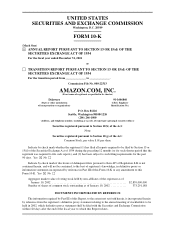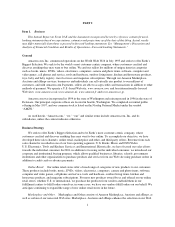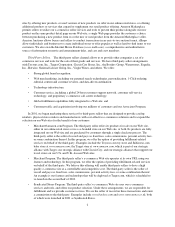Amazon.com 2001 Annual Report Download - page 16
Download and view the complete annual report
Please find page 16 of the 2001 Amazon.com annual report below. You can navigate through the pages in the report by either clicking on the pages listed below, or by using the keyword search tool below to find specific information within the annual report.Other companies in the retail and e-commerce service industries may enter into business combinations or
alliances that strengthen their competitive positions. We also expect that competition in the e-commerce channel
will intensify. As various Internet market segments obtain large, loyal customer bases, participants in those
segments may expand into the market segments in which we operate. In addition, new and expanded Web
technologies may further intensify the competitive nature of online retail. The nature of the Internet as an
electronic marketplace facilitates competitive entry and comparison shopping and renders it inherently more
competitive than conventional retailing formats. This increased competition may reduce our sales and/or
operating profits.
Our Business Could Suffer if We Are Unsuccessful in Making and Integrating Strategic Alliances
We may enter into strategic alliances with other companies through commercial agreements, joint ventures,
investments or business combinations. We have entered into third-party services agreements to provide services
related to e-commerce to companies like Toysrus.com, Borders Group, America Online, Circuit City Stores, and
Target, and we plan to enter into similar agreements in the future. Under such agreements, we may perform
services such as offering consumer products sold by us through Syndicated Stores; allowing third parties to
utilize our technology services such as search, browse and personalization; permitting third parties to offer
products or services through our Web site; and powering third-party Web sites, providing fulfillment services, or
both. These arrangements are complex and initially require substantial personnel and resource commitments by
us, which may constrain the number of such agreements we are able to enter into and may affect our ability to
deliver services under the relevant agreements. If we fail to implement, maintain and develop successfully the
various components of such arrangements, which may include fulfillment, customer service, inventory
management, tax collection, and third party licensing of software, hardware and content, our strategic alliance
initiatives may not be viable. The amount of compensation we receive under certain of these agreements is
dependent on the volume of sales that the other company makes. Therefore if the third party Web site or product
or services offering is not successful, we may not receive all of the compensation we are otherwise due under the
terms of the agreement. Moreover, we may not be able to succeed in our plans to enter into additional strategic
alliances on favorable terms.
In addition, our present and future third-party services agreements, other commercial agreements, joint
ventures, investments and business combinations create risks such as:
‰disruption of our ongoing business, including loss of management focus on existing businesses;
‰impairment of relationships with existing employees, customers and companies with which we have
formed strategic alliances;
‰difficulty assimilating the operations, technology and personnel of combined companies;
‰problems retaining key technical and managerial personnel;
‰additional operating losses and expenses of acquired businesses; and
‰fluctuations in value and losses that may arise from our equity investments.
The Seasonality of Our Business Places Increased Strain on Our Business
We expect a disproportionate amount of our net sales to be realized during the fourth quarter of our fiscal
year. If we do not stock popular products in sufficient amounts and fail to meet customer demand, it could
significantly affect our revenue and our future growth. If we overstock products, we may be required to take
significant inventory markdowns or write-offs, which could reduce gross profits. A failure to optimize inventory
in our fulfillment network will harm our shipping margins by requiring us to make partial shipments from one or
more locations. In addition, we may experience a decline in our shipping margins due to complimentary
upgrades, split-shipments and additional long-zone shipments necessary to ensure timely delivery especially for
the holiday season. If too many customers access our Web sites within a short period of time due to increased
holiday or other demand, we may experience system interruptions that make our Web sites unavailable or
7


